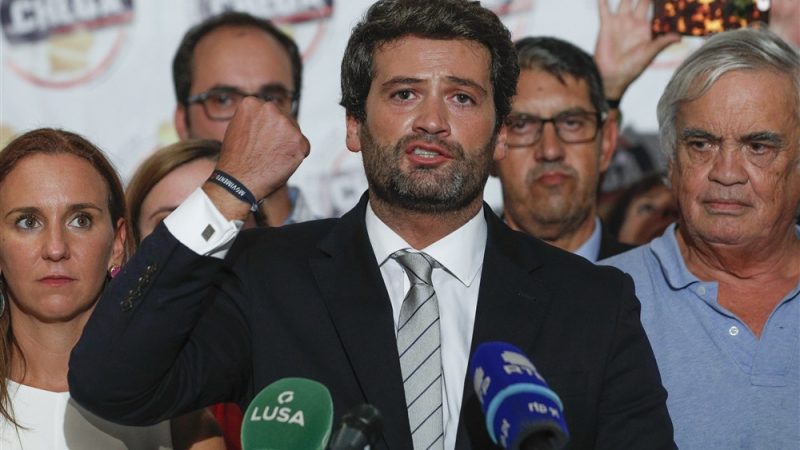Portugal To Have Third Snap Election, Chega Most Likely To Lead
As Portugal to have third snap election in five years on March 10, the political landscape is dominated not only by the shadow of corruption scandals but also by a rising wave of discontent among voters.
Author:Suleman ShahReviewer:Han JuMar 07, 202446.3K Shares735.5K Views

AsPortugal to have third snap electionin five years on March 10, the political landscape is dominated not only by the shadow of corruption scandals but also by a rising wave of discontent among voters. The hard-right party, Chega, has positioned itself as a formidable player in this election, riding on promises to tackle corruption and address pressing issues affecting the daily lives of the Portuguese people.
Since Chega's annual congress in Viana do Castelo three months ago, the party's electoral propaganda has blanketed lamp-posts along the main avenue, echoing its commitment to "end corruption and secure jobs for the boys in Portugal." While corruption undoubtedly remains a critical issue, the electorate is increasingly expressing concerns about matters closer to home, ranging from the cost of living and healthto education and housing.
The political stage was set for these snap elections following the resignation of Prime Minister Antonio Costa amidst a corruption investigation into the handling of major environmental projects by the Socialist government. The fallout has further fueled discontent, with former Socialist premier Jose Socrates facing trial over allegations of graft, fraud, and money laundering. The Social Democratic Party (PSD), Portugal's mainstream center-right formation, has also faced scrutiny, with two top officials in the Madeira Islands resigning amid a corruption investigation.
Amidst this backdrop, Chega's popularity has surged, from 1.3 percent of votes in 2019 to a projected 17 percent in the upcoming elections. Though still trailing behind the ruling Socialist Party (PS) and the Democratic Alliance (AD), led by the PSD, Chega's rise positions it as a potential kingmaker in a hung parliament.
Political analyst Jose Santana Pereira suggests that Chega's popularity stems from disappointment with the current government's performance and a perception that a future center-right government may not bring significant change. The impact of corruption scandals, while acknowledged, hasn't been the primary focus of the campaign, ranking sixth among the most discussed topics in televised debates.
Recent surveys indicate that voters are more concerned about the increasing cost of living, health, education, and housing. In conversations with residents, the prevailing sentiment is that Chega's striking posters dominate the visual landscape, yet discussions rarely revolve around corruption. Instead, the spotlight is on issues like healthcare accessibility, public education, and the housing crisis.
Portugal's rural areas, in particular, highlight the challenges faced by citizens. A resident in Beja, Milena Araujo, emphasizes the dire situation in public services, citing long waits for healthcare and a struggling education system. For many voters, these issues take precedence over the corruption scandals that have gripped the political elite.
While Chega's ascent has reshaped the electoral landscape, there are concerns about the potential instability of a government formed in a hung parliament. With party leaders expressing reluctance to form alliances, political analyst Santana Pereira believes that the likelihood of another snap general election is high.
Final Thoughts
Sunday's snap election in Portugal is poised to yield no clear winner, heightening uncertainty. Chega, the hard-right party, is expected to claim 15%-20% of the vote, positioning itself as a pivotal kingmaker. Renowned for its anti-corruption stance and advocacy for lower taxes, Chega is likely to dominate the Sao Vicente e Ventosa vote. The looming prospect of a hung parliament adds intrigue to the unfolding political landscape.
Jump to

Suleman Shah
Author
Suleman Shah is a researcher and freelance writer. As a researcher, he has worked with MNS University of Agriculture, Multan (Pakistan) and Texas A & M University (USA). He regularly writes science articles and blogs for science news website immersse.com and open access publishers OA Publishing London and Scientific Times. He loves to keep himself updated on scientific developments and convert these developments into everyday language to update the readers about the developments in the scientific era. His primary research focus is Plant sciences, and he contributed to this field by publishing his research in scientific journals and presenting his work at many Conferences.
Shah graduated from the University of Agriculture Faisalabad (Pakistan) and started his professional carrier with Jaffer Agro Services and later with the Agriculture Department of the Government of Pakistan. His research interest compelled and attracted him to proceed with his carrier in Plant sciences research. So, he started his Ph.D. in Soil Science at MNS University of Agriculture Multan (Pakistan). Later, he started working as a visiting scholar with Texas A&M University (USA).
Shah’s experience with big Open Excess publishers like Springers, Frontiers, MDPI, etc., testified to his belief in Open Access as a barrier-removing mechanism between researchers and the readers of their research. Shah believes that Open Access is revolutionizing the publication process and benefitting research in all fields.

Han Ju
Reviewer
Hello! I'm Han Ju, the heart behind World Wide Journals. My life is a unique tapestry woven from the threads of news, spirituality, and science, enriched by melodies from my guitar. Raised amidst tales of the ancient and the arcane, I developed a keen eye for the stories that truly matter. Through my work, I seek to bridge the seen with the unseen, marrying the rigor of science with the depth of spirituality.
Each article at World Wide Journals is a piece of this ongoing quest, blending analysis with personal reflection. Whether exploring quantum frontiers or strumming chords under the stars, my aim is to inspire and provoke thought, inviting you into a world where every discovery is a note in the grand symphony of existence.
Welcome aboard this journey of insight and exploration, where curiosity leads and music guides.
Latest Articles
Popular Articles